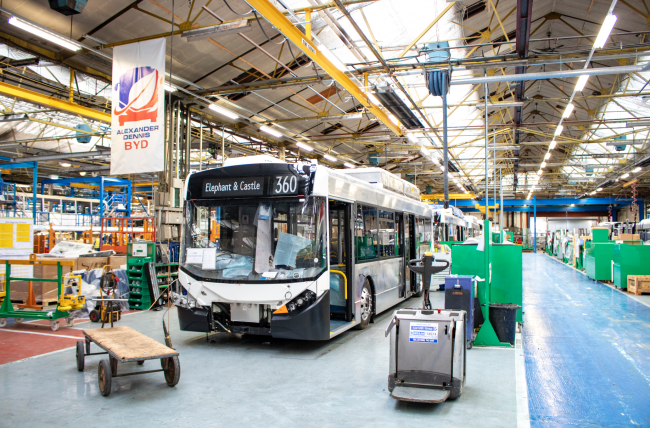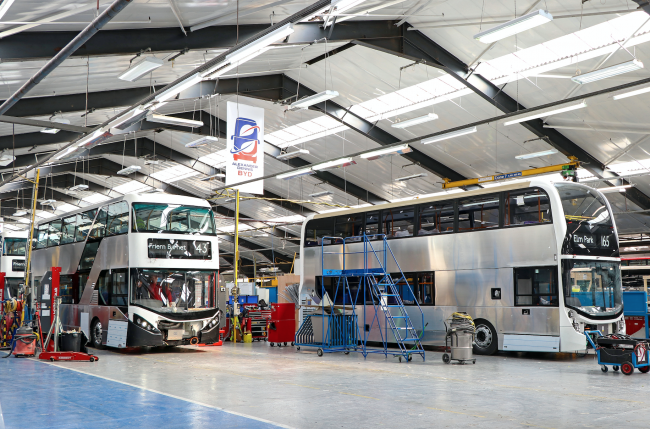5 minute read • published in partnership with NexSys
Case Study: Automation keeps the wheels turning in Alexander Dennis’ complex global supply chain
Alexander Dennis has earned many accolades in just under two decades of business. It is a long standing member of the NFI Group, the largest bus and coach manufacturer in the UK as well as the global leader in the design and manufacturing of double decker buses. To support a business of this magnitude you need to manage all elements of your supply chain seamlessly.
Supply chain delays, firstly affected by COVID-19 and then the Russian invasion of Ukraine, have put the brakes on many manufacturers’ output. But as lead times for parts begin to shorten, slow supply chain management processes can also create scheduling delays and slow down finished product.
Bus manufacturer Alexander Dennis has 15 facilities in 9 countries and purchases tens of thousands of different SKUs in a complex global procurement operation. Its vehicles have battery-electric, hydrogen-fuel cell, diesel and hybrid drivelines and are assembled in a variable schedule on the same lines, so parts will vary hugely from bus to bus, and punctual Kanban, or parts delivery on the line, is essential to avoid costly line stoppages.

Picture: Alexander Dennis
Material availability is one of the most important metrics for Alexander Dennis. But the company’s enterprise IT also has to manage an important aftermarket business and find process efficiencies at all levels to keep the company lean, as costs have risen so sharply.
For over 20 years, Alexander Dennis has used SYSPRO to manage its enterprise IT systems. More recently, Alexander Dennis worked closely with NexSys, AD’s long-term SYSPRO partner to introduce some new solutions to assist the business. At the heart, these new solutions focus on improving AD’s supply chain management (SCM), data integration and robot process automation.
Supply chain and material availability
Sourcing correct parts on time is the core of an automotive manufacturer. Alexander Dennis has done a lot of software development leveraging NexSys tools to solve this business need: SYSPRO’s MRP, DataSwitch, NexSys’s purpose-built automation and integration tool, and through Business Intelligence software. This clever solution ensures that it has high material availability, can manage the status of purchasing lines and that its production lines don’t stop.
Increasingly, Alexander Dennis has used automation software to speed up data exchange, including NexSys’s DataSwitch, which automatically receives supply information from suppliers in any data format and translates it. SYSPRO MRP works alongside DataSwitch to calculate the required parts and volumes and automates the admin around this by providing the confirmed dates of parts deliveries, to give just one example. The change this has made is profound: instead of not knowing when certain parts will arrive due to macro-driven delays, accurate dates of material availability are now reliable.
“This has removed a lot of labour from the purchase order and schedule process, allowing the supply chain management team to focus more on supplier relationships and service,” says Mark Day, Business Improvement Leader at Alexander Dennis. “This gives us higher material availability.”

Picture: Alexander Dennis
Information flow and automation is key to perfect SCM
Alexander Dennis knows what buses it needs to build on a schedule and SYSPRO converts and stores this data as a bill of materials with appropriate lead times. In normal times most components can be sourced in three weeks, but changing world events have now pushed availability to 6 or 7 weeks for some parts and flexes constantly. When a supplier knows they can’t hit a lead time, they send the updates through multiple methods, DataSwitch receives these and automatically pushes the change through the MRP, which calculates the problems each change will place on the build schedule.
Larger customers often use EDI, but smaller garages do not. RPA can read PDFs, translate this to raw text format and pass on to DataSwitch for onward processing – removing thousands of manual data entry actions at Alexander Dennis’s call centre.
“We can now tackle examples where the customer was not willing to change to an EDI route,” says Mark. “The real value is not the saving manual typing of orders, but that these colleagues can spend more time on value-add, improving aftermarket customer service and helping to reduce any backorders. For every sales order they don’t need to enter, they could call a customer.”
RPA is also used for the internal specification amendment process. Customers can change the specification of a bus during or post-order. These amends used to pass through Commercial, Engineering and Operations, and often got mislaid or delayed. Alexander Dennis used RPA to create a workflow to see these amendment bottlenecks in different departments.
Automating the updates are essential. “The USP is DataSwitch as an integration tool. DataSwitch is a very easy method to automate and integrate that has allowed us to react quickly to new requirements and changes, whereas some ERP systems are more rigid and the time needed for automating the tasks is longer,” Mark says.
Robot process automation – the next stage in Alexander Dennis’ supply chain management
From 2021 to 2022, Alexander Dennis implemented a robot process automation (RPA) solution Suppliers normally need time to synchronise which data format they use for their customer, such as EDI or web-based. In most cases, DataSwitch can manage this data translation alone, but in some cases RPA helps increase this flexibility. Alexander Dennis has a big aftermarket business for spare parts, and buses can be decades old.
The amendments incurred costs, so faster identification of specification changes allows Alexander Dennis to provide better service to the customer, save money and improve safety and quality standards. The full tech stack that Alexander Dennis has built has sped up the change process to give the company more time to react to ensure production quality in high volume is maintained.
Delivering customer requirements
Alexander Dennis manufactures all its bus variants on the same production lines, building various models in the same production sites. Now the company can “order on demand”, helping thin its stock profile without reducing material availability.
Alexander Dennis also builds buses in China for the Asia-Pacific market and DataSwitch integrates with DHL, its main logistics supplier, to cross-doc materials. “This avoids UK suppliers for buses in China sending parts to us,” says Mark. “They send direct to DHL who ship it, managed all through SYSPRO. This is where DataSwitch has really helped us turnaround very big integration projects in very short timescales.”
The full tech stack that Alexander Dennis has built has sped up the change process to give the company more time to react to ensure production quality in high volume is maintained and customer requirements are met.
